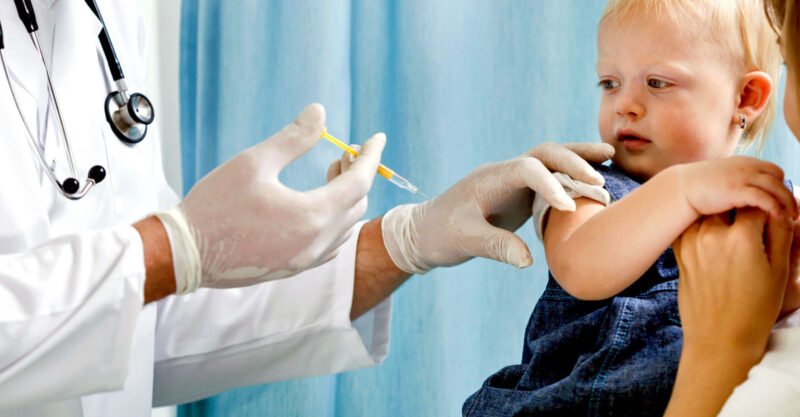The Centers for Disease Control and Prevention’s independent vaccine advisory panel will meet on Wednesday and Thursday. While the wording on the meeting agenda is vague, it appears the committee may vote on whether to add the COVID-19 vaccine to the Child and Adolescent Immunization Schedule.
The Centers for Disease Control and Prevention’s (CDC) independent vaccine advisory panel will meet on Wednesday and Thursday. While the wording on the meeting agenda is vague, it appears the committee may vote on whether to add the COVID-19 vaccine to the Child and Adolescent Immunization Schedule.
The CDC’s Advisory Committee on Immunization Practices (ACIP) meets three times a year to discuss vaccine recommendations. Afterward, the agency sets immunization schedules based on the committee’s recommendations.
This week’s agenda also includes a vote on adding the COVID-19 vaccine to the federally funded Vaccines for Children Program, which provides vaccines at no cost to children who might not otherwise be vaccinated because of inability to pay, and the “2023 child and adolescent schedule revisions.”
Children’s Health Defense (CHD) will livestream the Wednesday and Thursday meetings here.
Commenting on the upcoming meeting agenda, Mary Holland, CHD president and general counsel, said, “We truly don’t know what the ACIP means by ‘revision of the childhood schedule’ on its agenda for October 19-20. It is ominous.”
However, Holland added, “It would be completely unprecedented for the CDC to put such a dangerous and inadequately tested shot on the recommended childhood vaccine schedule. But would they do it? They may well.”
The legality of adding a COVID-19 vaccine to the childhood immunization schedule is yet to be determined. But Holland told The Defender if the CDC tries to add the COVID-19 vaccine to the Vaccines for Children Program this week, CHD will take up the issue in court.
“Would CHD fight it? You can count on it!” she said. “We will consider every avenue in the courts of law and public opinion to stop this insanity leading to school-mandated COVID shots for kids,” Holland said.
CHD is asking people to contact members of the advisory board and request that they not vote to add the COVID-19 vaccines to the childhood schedule.
All COVID-19 vaccines being administered in the U.S. to people under 18 are Emergency Use Authorized (EUA) products.
Moderna’s two-dose primary series COVID-19 vaccine is authorized for emergency use in infants and children ages 6 months to 17 years, and the Pfizer-BioNTech two-dose primary series is authorized for emergency use in infants and children ages 6 months to 12 years.
The Moderna and Pfizer primary series COVID-19 vaccines for infants and children target the Wuhan strain, which is no longer circulating.
The U.S. Food and Drug Administration (FDA) did grant full approval to Pfizer’s Comirnaty COVID-19 vaccine for ages 12 and older, however, the Comirnaty vaccine is not available in the U.S. — which means all children who get the Pfizer vaccine are getting an EUA product.
Earlier this month, the FDA authorized — without safety data or independent review — the new Pfizer and Moderna COVID-19 Omicron booster shots for children as young as 5 years old.
Vaccine makers are not liable for injuries or deaths associated with EUA vaccines but can be held liable for injuries caused by a fully licensed vaccine — unless that vaccine is added to the CDC’s childhood schedule.
Steve Kirsch, executive director of Vaccine Safety Research Foundation, in a Substack post Monday, wrote that if the CDC votes to add the COVID-19 vaccine to the childhood vaccination program, it means “the ‘emergency’ can end, but the liability protection lives on.”
“This is the big prize for a vaccine manufacturer,” Kirsch wrote, adding, “That’s why they’ve targeted the kids with a vaccine that they don’t need.”
According to Kirsch, “If you get put on the CDC childhood vaccine schedule, it means:
- “Liability protection forever for not just the vaccine for kids, but for the adult vaccine as well.
- “All states require vaccination in order to attend public school. Many tie their list to the CDC list or a subset thereof. So getting on the list is a key step to being mandated in many states.”
According to the Ethics and Public Policy Center, there is no need for a primary series of COVID-19 vaccines for children, as there is minimal evidence the COVID-19 vaccine benefits children.
Data collected by the CDC through its Vaccine Adverse Event Reporting System (VAERS) indicates serious health risks associated with COVID-19 vaccination for children.
As of Oct. 7, the VAERS data for 6-month-olds to 5-year-olds who received a COVID-19 vaccine showed reports of 4,279 adverse events, including 182 cases rated as serious and 7 reported deaths.
For 5- to 11-year-olds, there were 14,622 reports of adverse events, including 692 rated as serious, and 29 reported deaths.
VAERS is the primary government-funded system for reporting adverse vaccine reactions in the U.S. While reports submitted to VAERS require further investigation before a causal relationship can be confirmed, VAERS historically has been shown to report only 1% of actual vaccine adverse events.
Sign up for free news and updates from Robert F. Kennedy, Jr. and the Children’s Health Defense. CHD is planning many strategies, including legal, in an effort to defend the health of our children and obtain justice for those already injured. Your support is essential to CHD’s successful mission.




